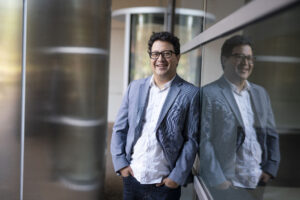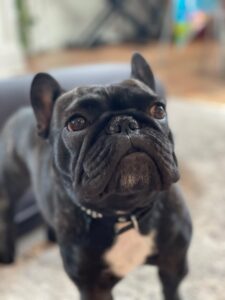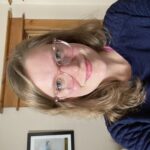A Conversation with Dr. Carlos F. Lopez
Interview conducted and transcribed by Alexandra Blee
Welcome to the first installment of a new monthly blog series focused on diversity, equity, and inclusion (DEI) within our Vanderbilt and Department of Biochemistry communities. Through conversations with trainees, staff, and faculty within our department, we hope to build a culture of curiosity, a willingness to share, and understanding when it comes to both our differences and our shared experiences. For our first conversation, I spoke with Dr. Carlos F. Lopez, Associate Professor of Biochemistry, Biomedical Informatics, and Mechanical Engineering. Carlos was recently appointed to lead the Biochemistry Department’s Diversity, Equity, and Inclusion Committee.
AB: Before we dive in, a brief introduction to Carlos’ outlook on DEI within Biochemistry and Vanderbilt as a whole.
CL: Thanks Alex. DEI has different interpretations depending on the context. In biochemistry, I think diversity is when we have individuals from many different cultures and backgrounds all working together towards a common goal. Equity is all about ensuring that each individual has fair, impartial access to resources needed for them to be successful. Inclusion is when these all come together and individuals develop a sense of belonging, a sense of identity, as members of the biochemistry community.

AB: Could you please tell us a little bit about yourself and what you do here at Vanderbilt?
CL: Well, my name is Carlos Lopez, I grew up in South America and came to the US for college, so I’ve been in the US for 27 odd years. It’s like my second home; I don’t know which one is my first home or my second home anymore. I came to Vanderbilt in 2012 and I have been working in systems biology, so I am the oddball that does math modeling in a largely experimental setting – ha!
AB: Can you go into some detail about what kind of systems you apply your modeling to?
CL: Yes, my lab studies one big theme: complexity. For example, if you have chemical reactions in a network or a cell, you can understand one or two interactions using Michaelis-Menten kinetics. But once you have one interaction that connects to another that connects to another, it becomes a very complex system. I’m very interested in things that are locally simple but globally complex. Specifically, I apply that knowledge to understand how cells carry out functions, respond to perturbations, and ask why some cells survive and some cells die given the same perturbation. I’m also interested in the dynamics of networks and how biochemical noise affects networks. There’s an emergent property that comes out of these kinds of interactions. For example, when you have cell death, not all cells die; the organism is happy if only 20% die because that’s what it needs. So, I’m very interested in emergent behaviors of cellular processes.
AB: I don’t know if people always think about research diversity when we talk about DEI. You mentioned you thought of your research as the oddball and that you bring a unique perspective to the department, which I think is important to note.
CL: Yes! Research diversity is very important too. I think that people would say that Vanderbilt is not traditionally strong in computation, yet we have really strong computational people all around! I think research diversity adds different perspectives to our community and is key to advance progress in science.
AB: Could you also tell us something that you like to do outside of your research or tell us more about what makes you, you?
CL: Oh man! I like coffee!
AB: Fueled by coffee!
CL: Coffee is my birthstone. I go very far for good food and good coffee.
AB: Do you ever get involved in roasting your own beans?
CL: Yes! I grew up in Colombia and my grandma used to roast her own coffee. I have an aunt that still lives in the mountains in the coffee-growing parts of Colombia. I live that heritage and therefore I like good coffee. I used to roast my own but now with kids I don’t have time for that, so I just buy it. But I think a walk with my dog and coffee is probably my favorite thing, or going for a drive, also with the dog. I have a Frenchie (she wants my coffee). Her name is Nadia.

AB: I’m sure it helps to have those passions in your life, because sometimes science doesn’t go quite so well. I wanted to ask if you’re willing to share a recent failure of yours that might have been particularly interesting and that you learned something from.
CL: I’ll share a failure that is not recent, but I still remember it. When I was applying for faculty positions back in 2007, my original training was in chemistry. I got some offers that I did not want; the schools I liked didn’t want me. Rather than accepting those offers, I went for another postdoc. It was not a failure in that I didn’t find a job, it was more of a transition. The failure came when I was looking for a second postdoc. There was a very well-known person at MIT that I really wanted to work for. He invited me for an interview. I was very excited. I’m vegetarian, so he ordered Chinese vegetarian food for the lab. The idea was that I would come, give group meeting, and get to know everyone. They ordered eggplant tofu for me which is very greasy. So, I arrived at the interview, and I was wearing my suit, white shirt, that kind of thing. We’re sitting down and serving the food and the PI sat next to me. He asked me a question as I served my rice and eggplant tofu and put the plate on the table. I move a lot when I talk, and when I was talking to him, I moved my hand and catapulted the plate off the edge. Rice flew everywhere and the eggplant tofu landed on my chest. It was hot and so greasy that it just rolled down my shirt. Because it was oily, all of a sudden, my shirt became see-through. I didn’t know if I should take my coat off or leave it on, and now I stunk like eggplant tofu! The PI had rice in his hair, and I think I even tried to remove some rice grains from his hair… I wasn’t sure if I should clean it… I never recovered. I gave a really terrible talk. It was so hard.
AB: That would really get in your head.
CL: I could not come back from that. He seemed so ready to hire me that he invited me for a two-day visit, but the next day I just felt like a scolded dog hiding my tail the whole day. But that’s how things work. That postdoc would have been aligned with what I did before. When I kept looking, I found a postdoc in something that was very outside my comfort zone. When I talked to the PI that would become my next adviser at the time, we both agreed to give it a shot and see what happens. It was the best thing. Leaving my comfort zone and not knowing what I was doing and spending time learning something new was life changing. This failure forced me to broaden my horizon and something positive came out of it. But oh, that was a bad interview. Those are the things that no one ever talks about.
AB: The PI probably didn’t view it as a dealbreaker, but if it gets in your head and sinks in, it would be hard to recover.
CL: I couldn’t perform, yes. I felt so bad that he had rice all over his hair. I still remember. I’m still embarrassed about it. Whenever I see him in meetings I think “where’s the exit”?
AB: I’m sorry. It’s a good story now and it’s also very relatable.
CL: The message is yes, you will fail at some things and some talks might not be perfect, but things tend to work out in the long run.
AB: To focus in more explicitly on DEI, I want to know what change you want to see within your community at Vanderbilt, or Vanderbilt as a whole, to enhance your perception of DEI here.
CL: I think that we have a very diverse community, especially at the trainee level and generally we do okay in terms of how equity is distributed. But I think we struggle with inclusion.
AB: Can you explain what you mean by inclusion?
CL: I think that inclusion for me is not just that you are welcome, it’s that you belong. It’s that this is your family, this is your place, this was built for you. We still have work to do in Biochemistry and Vanderbilt in that space. I’ve been thinking a lot about how we build that. To me, the answer is by building culture. That means we are going to have to spend time talking about these topics. For example, I would love to have more events where people are open to talking about sometimes difficult topics, like how different backgrounds affect your research and how you do your research. For example, I think my lab has been very diverse and has been reasonably successful. Yet, some people would say that to run your lab, you have to make sure your students spend X number of hours a week to be productive. To me, creativity happens in unpredictable ways and sometimes you need to spend 12 hours in the lab, but sometimes you are better off taking a walk in a park and thinking. I’ve taken a different approach in my lab where I’ve said I want to see progress, but I don’t care when you do it. That actually shifted the culture in a way that people own their work more. It makes them more responsible and excited to do their own work because they can do it whenever they want and pursue their goals. Creativity doesn’t come when you want it. Creativity surprises you when you least expect it. For me, usually when I’m walking the dog or playing with my boys.
AB: It’s interesting that you bring up how that’s been part of your lab culture from the beginning, because many research labs are shifting more towards that mindset just by nature of the pandemic. I think it’s for the better.
CL: I would like to see more discussion about these issues. I would like to start a seminar series where we talk about failures and challenges over tea and biscuits. Let’s have tea time!
AB: Stemming from that and talking about challenges for people in DEI, what is one aspect that you personally find challenging? How have you approached whatever that might be?
CL: A big challenge for me has been how I see the world. There’s a constant realization that because I’m from South America, I come from a very different background and have a very different worldview than other people in the community. A hard thing has been how I might be misunderstood as not being committed enough, or how my enthusiasm for something is misunderstood as being too enthusiastic. It’s harder to understand people that are not like us. I think that the traditional approach, not just at Vanderbilt but in our community in the US, has been “we’ll welcome you as long as you are like us”. I think things are shifting more towards “let’s just be inclusive of others and let’s recognize those differences”. This has been the challenge for me; how do I coat switch from one situation versus another? When can I be my happy, salsa-dancing Colombian self, versus when do I have to wear the properly put-together, socially acceptable professor coat?
AB: That reminds me of the idea that America is a melting pot, which could imply that when others come here, they have to shed some unique aspects of their identity to fit a mold. You’re highlighting that there could be another view where we as a collective culture see all those unique aspects and appreciate them, less like a melting pot but more like a mosaic where everyone keeps their own unique flavor.
CL: Correct. I think we are slowly getting there, but it takes time, lots of conversation, and is still a learning experience for me.
AB: That’s probably true for many people on both ends of the spectrum. On one end, there’s a need to understand and recognize that oneself might be part of the problem; we shouldn’t expect someone to fit into a specific mold or stereotype. From the other perspective you mentioned, you want to keep your identity and don’t want to be misunderstood. Thank you for sharing. To wrap up, do you have any advice that you want to share?
CL: Sure. There was a Spanish writer Miguel de Unamuno, and he wrote something along the lines of “Fascism is combatted through reading and racism is combatted through travel.” He wrote this many decades ago, but the way I interpret that now is biases are combatted through education and reading. Racism, preconceived notions, and how we think we see the world are combatted by putting yourself outside of your comfort zone. What I would say is, read and learn about the world around you. Try an ethnic restaurant for a change or go to a festival for another culture and see what you learn. Try something different. You’ll be surprised. I recently went to a Greek Orthodox church event and the food was outstanding, the people were so nice, and I learned a few things about Greek culture that I didn’t know before. To me, those are the learning experiences that we need.
AB: I think that’s great! Hopefully others will discover some new food and traditions.
This concludes our conversation. I really enjoyed hearing Carlos’ perspectives and personal experiences. We hope this discussion will open the door for more sharing, understanding, and empathy across our department as we dive into what diversity, equity, and inclusion mean to our community. Please comment below with your thoughts, and if you know someone who you would love to hear from, or want to share your own perspectives, email Alexandra Blee at alexandra.blee@vanderbilt.edu.
Alexandra is a postdoctoral researcher with interests in precision medicine, tumor genomics, and the structure and function of DNA damage repair proteins. One of her go-to hacks is to stock her freezer with cookie dough, ready for freshly baked cookies on-demand to celebrate a successful experiment or a lesson learned from a recent failure!

Leave a Response
You must be logged in to post a comment